- Home
- Chris Petit
The Psalm Killer Page 2
The Psalm Killer Read online
Page 2
He rucked the skirt up further, and felt his way between her legs with his hand. He’d never seen a woman so urgent and his awe of her made him uncomfortably hard. He worked a finger into her but she wasn’t having it, so he tried removing her knickers instead.
‘Leave them,’ she said hoarsely as she yanked open his flies. ‘I’d have fucked him first if he hadn’t been such a pig.’
The thought of eyeless Tommy watching, growing cold in the boot, and him having Tommy’s fuck, made him feel like a god. He remembered Tommy’s words to the woman while they were kissing, and repeated them.
‘Tommy’s getting awful stiff by now.’
She gave a harsh bark of laughter and drove herself against him even harder, until he was unaware of any time or any thing other than the tight heat around his groin, her weight and her teeth and tongue. She grabbed the hair at the back of his neck as she started her climax, and he listened to her orgasm being wrenched from her in a series of grunting moans, and watched her face screw up with pleasure or pain, he couldn’t tell. Christ, he thought, the whole thing was far more violent than the murder of Tommy Herron.
She lifted her head and searched his eyes, like he was the dead man not Tommy. Then she got off and sat back in the driver’s seat and leaned down and took him in her mouth, but he stopped her, saying it didn’t matter because he wouldn’t come. She carried on for a while, then put his still stiff cock away, asking him if he was sure and he said yes, and as she drove off he could smell the sex on them.
‘I owe you,’ was all she said.
Three and a half minutes, he saw from the clock on the dashboard. It had felt like a fuck in eternity.
Two days later Tommy Herron’s body was found by a roadside in Drumbo, south of Belfast. The jacket was still pulled over his head, the gun in its holster, his arms neatly arranged across his chest. No one claimed the killing.
1
January 31 1985, South Armagh
IT was always the same nightmare. Cross saw them lined up in rows, in stretches of city wasteland – those derelict spaces once described to him by a child as the blank bits where things had been before they’d got blown up. There was a box for every one killed since it began.
He could put a name to every box, those he’d known and the hundreds he hadn’t, which he knew was impossible. Then without warning he was back in some police examination hall and across from him were men whose funerals he would attend. Tommy Farrell blown up in his car, with none of him left to put in his box, which they had to weigh with sandbags, and Robert McNulty shot by a sniper. Cross found himself stuttering painfully to conceal from McNulty’s widow that there was nothing to recognize of her husband after the high-velocity bullet had done its job.
McNulty got muddled up with the dead paratrooper as the dream switched to invade his childhood. He saw himself aged seven standing in the hallway of his childhood home, transfixed by the hammering on the door, and when he opened it the paratrooper, shot in the head on the path outside, fell bleeding on to him.
After that, the army patrol held his family at gunpoint for the rest of the night, threatening torture and shooting, while Cross watched in guilty fascination as his mother fell apart in spite of the tranquillizers.
Knowing that this part of the nightmare was wrong only made it worse, even as it happened. There had been no war where he grew up.
Cross heaved himself free of the dream, not sure where he was, thinking at first that the train was a continuation of it. He wondered how long he had slept and how much time they had lost. Trains rarely ran on time and his had been late leaving. They had been gone nearly two hours, he saw, which meant that they ought to be near the border. His spirits sank at the thought.
Outside, night was falling on winter fields and the threat of rain in a troubled sky made it feel like another day altogether from the mild, sunny afternoon he had enjoyed in Dublin. Cross thought about the wretched limbo that awaited his return.
The charge was ridiculous. When informed of the complaint by the acting Detective Chief Inspector, Cross had trouble recalling the woman. The DCI had made it plain that he believed the accusation was false, but in the present climate of inquiry the police had to be seen to be investigating itself properly.
The train braked to a halt. At first he thought it was Newry, but there were no lights. Catching sight of his reflection in the window, he wondered if he looked like a man capable of sexual assault.
He could only vaguely picture her, a rail-thin, pinched woman with a face he had trouble remembering, an air of doped hysteria and a look of collapsed determination. Cross thought she could have been anything between forty and sixty. She lived in one of the modern jerrybuilt towers that had aged as badly as its tenants, known as ‘stack-a-prole’. He wondered sometimes if the bombers couldn’t put their work to better civic use by blowing up something whose demolition none would mourn.
Her living room was dominated by the usual Catholic icons of the Virgin Mary and the flickering television set that stayed on regardless. It was a routine questioning, which he was only attending because he was concerned about the WPC’s lack of experience. The smell was what he remembered most – the stale saturation of years of fried food, alcohol, and an endless chain of nicotine.
According to her statement, the WPC had gone off to make a telephone call as there was no phone in the flat. Cross had forgotten about that until the DCI had reminded him. He probably should not have continued the interview alone, but this hardly seemed of consequence until the woman had lodged her complaint.
‘Sexual assault,’ said the DCI, looking embarrassed and apologetic.
The train showed no signs of moving. A ripple of impatience ran through the carriage. It was fuller than Cross remembered, with people standing in the corridors. Eventually they moved forward a few hundred yards and stopped again.
‘Bloody security alert,’ said a woman across the way and went back to reading her book.
It was curious, he thought, how everyone behaved as though everything were normal until they were told otherwise. A guard passed through the carriage, instructing everyone to evacuate the train, making sure that they took their belongings. ‘These things are sent to try us,’ he announced cheerfully, earning murderous looks.
Cross sighed, reluctant to leave the warm fug. Outside, through the opposite window, were lights and movement. He wondered again if he should get out of the force. The last post he had applied for – chief security officer at the Electricity Board – forty other officers had put in for, a fair indication of the state of morale in the force. He lacked the civilian contacts enjoyed by his Protestant colleagues, and stubbornly refused to make use of his father-in-law’s influence.
From the top of the makeshift steps down from the carriage Cross saw a line of men in uniform standing inside the range of the train’s lights, the dark green of the police and the camouflage of the army. Soldiers were herding the passengers into groups a short distance from each carriage. The scene was further lit by the headlights of armoured Land Rovers.
The faces in the crowd looked apprehensive and subdued, like the victims of a mass arrest. Cross too felt the vague guilt of the innocent in the face of authority (and he a policeman). The scene was strangely silent. No explanation was forthcoming. He reckoned a delay of two hours at least. It was chilly and wet underfoot, and mud sucked at his shoes. A raw and steady breeze blew across the fields. At least the rain was holding off, he thought, shrinking into his overcoat as the last of the heat of the train slipped from him. The mildness of Dublin seemed like an illusion.
Dublin had been a relief from Belfast and Cross was able temporarily to shake off the low cloud of apprehension that had hung over him since his suspension. The trip had been fixed by a colleague who knew of his frustration and had asked Cross to replace him at one of the informal meetings the RUC held with the Irish Gardai. The two forces met regularly, in spite of a reputation for poor co-operation.
McCarthy was the senior off
icer, about ten years older than Cross, a battered, friendly looking man who seemed more like a rumpled teacher than a policeman. The junior man, Doyle, had struck Cross as quiet but keen.
It was the post-Christmas lull when nothing much was going on. They noted the usual border movements and discussed an illegal arms shipment from the United States, which McCarthy’s sources said would take place in the spring and arrive in the South before making its way North.
‘These are pretty low-level scraps,’ said McCarthy. ‘Hardly worth the bother of dragging you down here.’
‘Not at all. I’m glad of the away day.’
The meeting had finished early and McCarthy reminisced about when relations between the two forces had not been so amicable. He had been involved in the investigation into the Dublin car bombings of 1974, which had killed nearly thirty people in the evening rush hour.
‘The ambulancemen in Talbot Street couldn’t tell the living from the dead, and the gutters were running with blood. There was a young girl decapitated and another two had been thrown together by the explosion so you couldn’t tell them apart. And we know who did it. Within a week we had their names, and we passed them on.’
‘And we did nothing?’ asked Cross, who remembered the story, though not its details.
‘Too bloody right, because the Brits told you to sit on your arses and suck your thumbs. After twenty-eight people had died.’
‘What were the Brits trying to hide?’
McCarthy spread his hands. ‘How far do you want to take it? We knew and you knew the Brits had a hand in the bombings. It was the Prods that did it, of course – it doesn’t take a genius to work out that the IRA isn’t going to bomb Dublin. It was a UVF gang out of Portadown, but everyone I spoke to says they didn’t have the expertise for an operation that size, not without help. At least one of the UVF fellows had been in the army and one school of thought is that they were being run by the army. It’s no big secret. Some of the newspapers said as much at the time, and we’re still waiting for an answer from you fellows. Most of the ones that did it are dead now, but I hardly call that justice, certainly not for the relatives of the victims.’
On the question of British motive, he said it was probably to do with the British and Irish governments signing an agreement over the North, which had angered the Protestants whose paramilitaries had close links with the security services. The message to Dublin was a clear one of hands off, and after the bombings the agreement fell apart.
‘I’m told the politicians in Belfast were crowing. Do you know what one of them said?’
Cross shook his head.
‘“Slap it into you fellahs – you’ve deserved every bit of it,” is what he said. And you wonder we’re still talking.’
Afterwards Cross had turned down the offer of a lift to the station. The younger officer, Doyle, insisted on accompanying him. Cross enjoyed the walk in the pale sunlight with its hint of spring, though he would have preferred it alone, to savour the rare occasion of being able to feel entirely safe. In Belfast part of him was always alert to the possibility of sudden danger, the peripheral moment of warning, the car drawing alongside or the hot blast of air that preceded the explosion.
Cross let himself be talked into a beer and they stopped off at a bar by the station. Doyle asked Cross about his English accent and he replied that he had transferred to the RUC because his wife was from Belfast and had wanted to go back.
‘How long have you been there?’
‘Twelve, thirteen years.’
‘Do you still feel an outsider?’
Cross smiled. ‘What else?’
The static of a loud hailer broke the silence. Its booming announcement told them that because of track damage buses would take them to another train.
‘Abso-fucking-lutely typical,’ said the man behind Cross, slapping himself to keep warm. ‘No sign of any buses. How long can they reasonably keep us here?’
Cross shrugged.
‘I’m serious.’
It was hard to tell. The man’s rabbity look gave an air of humour to everything he said. He offered Cross a cigarette, which he refused. The first drops of the rain arrived to add to the misery and Cross thought of announcing himself to one of the RUC, then decided against it, without being sure why, when he could use his rank to shelter in one of the vehicles. Maybe he identified with the huddled group of civilians more than with the sinister-looking phalanx lined up against them. Several soldiers, big-boned raw youths and surprisingly short (‘Feckin’ midgets,’ muttered the rabbity man), stood around looking impassive. Cross thought his nightmare preferable to this godforsaken scene. Its unreality made him wonder if he wasn’t part of an enormous collective dream of which the whole country was a projection: sullen fields as old as the struggle itself. Perhaps it was the destiny of this landscape, with its infinite possibilities of ambush, to be bound by hostility, and its people condemned by a decision of geography to a history of feuding, covert manoeuvres, field-craft and infiltration.
The distant lights of approaching buses became visible, making their way downhill before disappearing behind the hedgerows. Under the instructions of a sergeant they tramped across the muddy field to a gate.
Cross saw the soldiers checking papers and asking passengers the purpose of their journey. He looked back towards the train. Troops were moving through the lit carriages, guns at the ready. This wasn’t track damage, he thought, this was a terrorist hunt.
There was a sudden commotion from beyond the train, yelling, then a quick burst of semi-automatic fire, and the shouted command, ‘Halt! Or we shoot.’
At least they were doing it by the book, Cross thought. An excited buzz grew among the crowd. Troops hurried everyone aboard the buses, no longer checking papers. The smell of cordite carried on the breeze.
As Cross got on the bus, a flare went up. It hung in the sky, turning the landscape phosphorescent. He heard a longer burst from further away. As the light fell to a dull glow, he imagined the quarry zig-zagging, making for the trees, hit by a burst that whipped his feet from under him and turned his legs as suddenly rubbery as one of his children’s Mr Spongee toys. He didn’t care what anyone said, it was hard not to identify with the fox.
It was after ten by the time he got back. The buses had ended up driving all the way to Belfast in an erratic convoy, stopping off at stations in search of the promised train that never materialized.
After being dropped in the centre, Cross decided to walk before getting a taxi. The rain had stopped and there was still time for a beer.
He had a great love of Belfast. He loved it like an ugly child, less assured and more awkward than its capital sisters in England and the Republic. It was one of the divided cities of the century, along with Berlin and Beirut, except that everyone chose to forget Belfast. Cross relished its streets, the dirty weather, the bars, the unexpected friendliness of the people with their harsh accent, and the special flavour of its fierce history, so strong sometimes that Cross felt he could taste it.
The night streets were empty, apart from the occasional patrol. For all the daily reminders of danger, Cross enjoyed roaming the city, drawing inspiration from the ebb and flow of its movement, from the wonderment of so many lives going about their separate businesses. Streets as memory; brief snapshot moments kept his mind alive. Nothing thrilled his romantic side more than a second’s eye-contact in a crowd, a relationship made and lost in a moment.
Robinson’s was crowded so he drank in the Crown two doors down. The booths were full and he stood at the long mahogany bar, and wondered if these little epiphanies added up to anything. He was not religious, but he sometimes wondered if they weren’t evidence of a grander design. His agnosticism worried him. Of all places, this country was not one for sitting on the fence.
This time tomorrow, he would know. Everyone said that the result of the hearing was a foregone conclusion. The woman’s medical records showed a history of mental illness, stemming from an earlier incident of se
xual assault by a soldier, and Cross’s counsellor told him that his acquittal would result in her being put in psychiatric care. This left Cross feeling obscurely guilty, as though he were responsible in some way.
2
THE following day was quiet by Belfast standards. No one got shot, there were no explosions, no security alerts; everything ran on time. By nightfall it was another Friday like anywhere else, with the town going about its business, blowing off steam after the week. The bars in the city centre, where it was possible to mix without fear, and the barricaded sectarian drinking clubs in their respective enclaves all throbbed with a compulsive mixture of loud music, beery warmth and the din of loose talk which swelled to a crescendo in the hour before closing. Outside was foul and squally, which made drinkers all the more reluctant to leave the security of their bars. At ten past ten the Duke of York, a large pub in Donegall Street, was full to bursting when a white Range Rover with a rusted back panel and a smashed tail light pulled into the car park, the reflection of its brake lights flaring on the wet tarmac. Three men got out.
None of them spotted an old blue Triumph Toledo pulling in behind them and parking on the other side of the car park. There was nothing to show that the two men inside were on surveillance, except that British soldiers tended to adopt a regulation dress that was as obvious as a full uniform – leather jackets, jeans and sneakers, hair worn long.
They had followed the Range Rover from Woodvale in the north-west of the city, down the Crumlin Road. The men they were tailing were Protestant paramilitaries and the driver was under observation from an army team hidden in an attic across the road from his house.
The Toledo was alerted as the three men left, and at the next intersection it slipped in behind the Range Rover. It remained inconspicuous in the late-night traffic, following through the city centre and across the Lagan, then down Mountpottinger Road before looping back again over the river via East Bridge Street. The Range Rover continued at the same sedate speed, the three men drinking from cans, oblivious to what was behind.

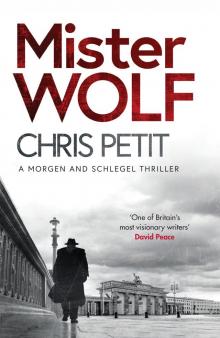 Mister Wolf
Mister Wolf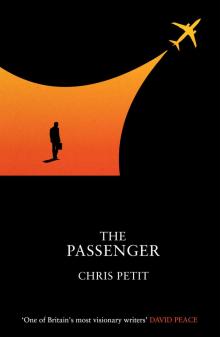 The Passenger
The Passenger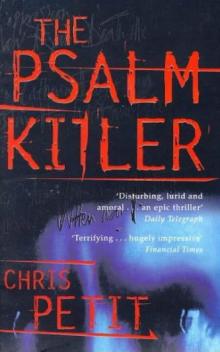 The Psalm Killer
The Psalm Killer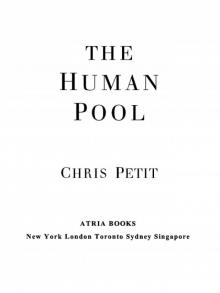 The Human Pool
The Human Pool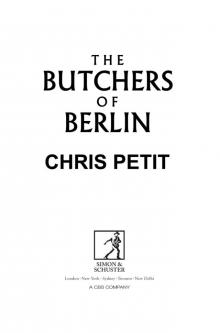 The Butchers of Berlin
The Butchers of Berlin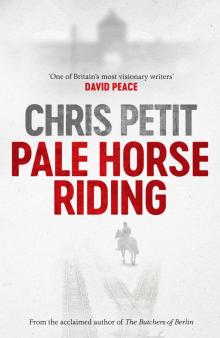 Pale Horse Riding
Pale Horse Riding